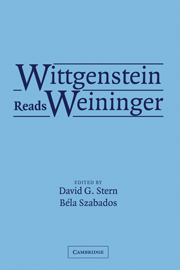Book contents
- Frontmatter
- Contents
- Contributors
- Reading Wittgenstein (on) Reading: An Introduction
- 1 Eggshells or Nourishing Yolk? A Portrait of Wittgenstein as a Weiningerian
- 2 Weininger and the Two Wittgensteins
- 3 Sex and Solipsism: Weininger's On Last Things
- 4 Wittgenstein and Weininger: Time, Life, World
- 5 Uncanny Differences: Wittgenstein and Weininger as Doppelgänger
- 6 Weininger and Wittgenstein on “Animal Psychology”
5 - Uncanny Differences: Wittgenstein and Weininger as Doppelgänger
Published online by Cambridge University Press: 11 December 2009
- Frontmatter
- Contents
- Contributors
- Reading Wittgenstein (on) Reading: An Introduction
- 1 Eggshells or Nourishing Yolk? A Portrait of Wittgenstein as a Weiningerian
- 2 Weininger and the Two Wittgensteins
- 3 Sex and Solipsism: Weininger's On Last Things
- 4 Wittgenstein and Weininger: Time, Life, World
- 5 Uncanny Differences: Wittgenstein and Weininger as Doppelgänger
- 6 Weininger and Wittgenstein on “Animal Psychology”
Summary
In memory of my father
Herbert Steuer
Engineer and Inventor
1918–2001
Introduction: the autobiographical project and the doppelgänger
The Weininger/Wittgenstein riddle is encapsulated in the concise, if enigmatic, formulation from Wittgenstein's letter to Moore where he claims that it is not necessary, or rather not possible to agree with Weininger, yet that “the greatness lies in that with which we disagree. It is his enormous mistake which is great. I.e. roughly speaking if you just add a ‘∼’ to the whole book it says an important truth.” The nature of that negation, further qualified by “roughlyspeaking,” is the object of much speculation. Yet it shouldn't be that way according to a passage from the Big Typescript section on “Philosophy”: “Since everything lies open to view there is nothing to explain either. For what might not lie open to view is of no interest to us … The answer to the request for an explanation of negation is really: don't you understand it? Well, if you understand it, what is there left to explain, what business is there left for an explanation?”
As the texts of both Weininger and Wittgenstein lie open to our view, does it follow that there is nothing to explain? Or rather is the feeling that there is a need for explanation due to our own system of categories and images which places too much intellectual space between Weininger and Wittgenstein?
- Type
- Chapter
- Information
- Wittgenstein Reads Weininger , pp. 138 - 168Publisher: Cambridge University PressPrint publication year: 2004



